
 Flash News
Flash News
Police officer in Kukës is raped, he is cut off under his house and beaten with hard objects
100 days or 16 years?
Saranda/ Election materials arrive for May 11 under police and military supervision
Student falls from second floor of school in Gjirokastra
From the maritime agreement with Greece to the Rama-Soros connection, Berisha speaks about the Greek media
Serious Challenges to Providing Doctors in Rural Areas in Kosovo and Albania

Kosovo and Albania face serious challenges in employing doctors and health staff in rural areas. A BIRN investigation shows that Kosovo's municipalities have a shortage of doctors, and the areas most affected by this deficit are villages. The situation is similar in Albania. Experts find that doctors and nurses are leaving.
The municipality of Peja is among the municipalities that has invested in the construction of medical centers in the villages, but due to the lack of doctors, the three ambulances, the one in Dobërdol, Poqesta and Glloxhan, are without doctors.
"These centers have been left without medical staff due to prolonged recruitment procedures and a shortage of doctors," says Arjeta Musliqi, an official in the Municipality of Peja.
A similar situation occurs in the municipality of Ferizaj, where four ambulances are inactive due to a lack of staff. Nadire Ymeri, director of the MFMC in this city, says that the MFAs in Varosh, Gaçka, Talinoc i Muhaxherët and Llojza are currently not active. Ferizaj has over 300 health workers, but according to Ymeri, these resources are not enough for all ambulances.
On the other hand, Arben Koshi, director at the MFMC in Gjakova, says that his municipality has no shortage of employees. According to Koshi, the working hours and the distribution of staff in the centers are done on a need-to-know basis. But, Koshi says that the shortages in his municipality are evident in medicines.
"One of the most obvious gaps is the supply of medicines from the Ministry of Health with medicines from the list of essential medicines (which amounts to around 35%), while thanks to the support of the Ministry of Health with the municipal fund for emergency medicines, it is possible to cover this gap at all," Arben Koshi told BIRN.
Is migration the cause of gaps in health?
The number of rural areas of Kosovo that are facing a lack of medical services is increasing, as is national and international migration. This is also affirmed by representatives of the Health Directorates in Kosovo, such as the one in Peja, who say that migration to third countries has an impact on the unequal distribution of medical staff in family centers.
"The reasons for the lack of staff are related to the prolonged competition procedures, the departure of doctors and nurses to third countries, specializations and the retirement of doctors and nurses," Arjeta Musliqi told BIRN.
However, the data claims that despite the emigration trends, Kosovo still has severe shortages of these workers. According to the latest population census by KAS, the number of inhabitants in Kosovo in 2024 was 1,585,566. Data from the same source shows that the number of medical workers during this year has reached a total of 26,636.
This means that for one medical worker there are 59.54 inhabitants. Compared to some other states where one medical worker is responsible for every 1,000 residents, this doctor-to-capita ratio is relatively good.
Albania faces shortage of medical staff
In Albania, the problems in rural areas are similar. According to official data, there are 264 health centers operating in Albania as part of Primary Health Care (PHC) in rural areas. According to the Ministry of Health and Social Protection, these centers are covered by medical personnel and are equipped with basic medications according to the standard package.
However, the unequal distribution of staff and geographical isolation mean that not all rural communities benefit equally from GP services. On average, each health center serves a population of 8,000 – 10,000 people (this figure fluctuates significantly in urban and rural areas), having a doctor/patient ratio of about 1 to 2,500 and a nurse/patient ratio of about 1 to 400 inhabitants.
According to Elson Jaçaj, president of the Association of Nurses of Albania, the shortage of nurses has become a widespread phenomenon in all health institutions, including the University Hospital Center "Mother Teresa".
"In many cases, there are no vacancies and the employment of a new nurse through the portal can take up to a year, even when he has won the test" - emphasizes Jaçaj.
He adds that low wages, the lack of coverage of transport costs or the difficulties of remote areas hinder the employment of nurses in rural areas.
"In many cases, the service in health centers is provided to citizens only by nurses, as there is a lack of doctors. The rule is that the employment of doctors and nurses is done on the basis of the population, which is currently not implemented in any hospital or health center in the country. This problem has led not only to fatigue and overload of staff, but also to a decrease in performance at work and an increase in stress among nurses."
In addition to the unequal distribution, the migration of health professionals abroad deepens the crisis. At the meetings of the Association, it is noticed that more and more nurses attend language courses with the intention of emigrating, mainly to Germany, Italy and England.
"The trend of departures has increased at a rapid pace and if measures are not taken, the gap will deepen significantly in the future" - warns Jaçaj.
In an effort to curb the departure of professionals, in 2024 the Albanian Government passed a law that obliges students of the Medical branch at the public university to work in Albania for three years after graduation or pay the full tuition fee. This decision has sparked objections and protests from students, taking the case to justice institutions in Albania, as well as to the European Court of Human Rights in Strasbourg.
Deficiencies in medical staff aggravate the health condition of vulnerable groups
Based on INSTAT and CENSUS 2023 data conducted in Albania, over 667,000 Albanians are over 60 years old, of which 60% live in isolated areas. The report of the Ministry of Health mentions that about 35% of visits to health centers and ambulances for 2023 were made by people over 60 years old.
According to the report of the organization "Together For Life" on Housing Health Services, it is found that often due to the inability to afford transport costs, the elderly choose not to receive the health service at all, thus risking the deterioration of their health situation. Also in the "National Action Plan on Ageing 2020-2024" are mentioned as problems of the health sector: transport and low expectations from services in rural areas.
"In order to meet the needs of the elderly and chronic patients in remote areas, the Residential Health Care Services program has been extended to all centers in the country, with a special focus on remote areas, providing assistance to those who cannot physically present themselves near health centers" - says Eduart Dedej from the Ministry of Health and Social Protection.
Relevant institutions promise changes
One of the main priorities of the Ministry of Health and Social Protection in Albania for the 2025 budget is the rehabilitation of 107 health centers across the country during the period 2025-2027, in order to improve access and conditions of health services, especially in rural areas.
In recent years, shortages of doctors in remote districts and areas have forced the Ministry of Health and Social Protection to offer bonuses to doctors who agree to work in cities where there is a need for specialists, bonuses that go up to 250,000 Lek above the salary. In Kosovo, municipalities promise to increase investments to remedy the situation.
The Health Directorate in Peja aims to build MFA in Trstenik, expand services at MFA in Boga, as well as open dental services at MFF in Baran and MFF in Raushiq. Also, the Director of Health in Gjakova says that the Annual Plan provides for a strategy for improving the quality of services at all levels of the SPC through the quality management system.
The Health Directorate in Prizren claims that it has plans to increase infrastructure, employ qualified personnel, health education, organize mobile medical services, as well as improve logistics. Meanwhile, Ymeri, on behalf of the Municipality of Ferizaj, stated that for the improvement of medical services in the MFF in the villages and the activation of the four MFAs, a certain number of staff is needed, for which they will again address the Ministry of Health and the Ministry of Finance as well as the Ministry of Health in the municipality "for the initiation of the announcement of the tender for the purchase of medical services according to any contract or agreement".
The decline in the number of the population in rural areas and the exodus of doctors are common challenges for both Kosovo and Albania. While Albania has begun to feel the first consequences of the "brain drain", Kosovo is in the early stages of this phenomenon and in "time" to avoid the spread of this practice by improving the conditions offered to medical workers and increasing the standard of living in the country.
"The problems lie in the normal functioning of these institutions. The shortage of medicines, medical equipment, and, occasionally, medical personnel makes these institutions unusable for patients. When these challenges are added to the lack of public transport and the difficult economic situation, the difficulties for patients in accessing health services become even greater" - PRAK tells BIRN.
The association also raises the problem of the unequal distribution of medical workers, especially in the main family medicine centers, which are overcrowded while centers in rural areas have a small number of patients. According to PRAK, another challenge for medical service providers in Kosovo is the fragmentation of these services, which forces patients to turn to the private sector.
One case that illustrates this problem is the situation of E.G., a resident of the village of Mramor in the municipality of Prishtina. The lady, who has lived in the village since 2008, says that she has received very few medical services from the AMF during this time, especially during her three pregnancies.
"The problems that appeared to me during my pregnancies were mainly treated in Prishtina, or in QKUK, or in private clinics, services that cost a lot. Even for children, here (in the village) I am often guided to the pediatrician in the city. Now I am not wasting time at all, I am going directly to Pristina" - says E.G.
The association highlights the lack of medical staff in some municipalities, and some of the health directorates in these municipalities claim this./BIRN By Arbërie Shaban and Oriada Dajko
'This article was produced with the financial support of the European Union in the framework of the project "Empowering Quality News and Independent Journalism in the Western Balkans and Turkey II". The content of this publication is the responsibility of BIRN Kosovo and in no way can it be considered as the position of the European Union'
Latest news







Berisha-Rama: The burner that was never lit will burn your political career
2025-05-06 21:24:49
Berisha from Durrës accuses Sakos and Gjushi: Terrorists of the elections
2025-05-06 21:13:15

The election materials of May 11 also arrive in Lezha
2025-05-06 20:53:44
Serious Challenges to Providing Doctors in Rural Areas in Kosovo and Albania
2025-05-06 20:37:55



Two riders die in tragic accident during Superbike race at Oulton Park
2025-05-06 19:46:35

He parachuted in Himara, Police take action against Jonathan Islam
2025-05-06 19:30:33
100 days or 16 years?
2025-05-06 19:12:46

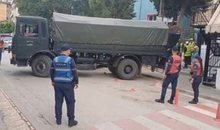


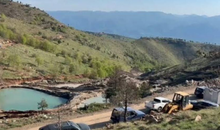





Bardhi akuzon drejtorin e Policisë Fier: Po pengon fushatën e PD
2025-05-06 17:17:22
Scandal/ Eduart Shalsi campaigns inside the Kukës police station
2025-05-06 16:56:02

CDU leader Friedrich Merz elected German chancellor in second round
2025-05-06 16:32:52




A suspect for espionage is detained in Kosovo!
2025-05-06 15:47:34
Meta: After May 11, new projects to heal the wounds of misgovernment
2025-05-06 15:37:29
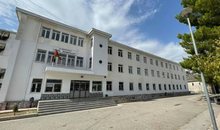
Student falls from second floor of school in Gjirokastra
2025-05-06 15:14:37
LDK proposes transitional government
2025-05-06 15:03:19


Incident in Korça, court releases Bledion Nallbat's brother
2025-05-06 14:27:19
Kopliku: The vote on May 11 for the DP-ASHM is the deserved punishment for Rama
2025-05-06 14:21:23
"Revival Caligula", Bujar Kapexhiu's gem of a caricature about Rama
2025-05-06 14:12:06
Rama's former negotiator, Zef Mazi, rejects EU passport propaganda
2025-05-06 14:07:43
The president of the Forza Italia senatorial group supports Berisha on May 11th.
2025-05-06 13:57:57
The Appeal Court of Appeal declares the mayor of Devoll, Eduard Duro, innocent.
2025-05-06 13:52:33

May 11th Elections, Bylykbashi: Extend the validity period of documents
2025-05-06 13:29:39
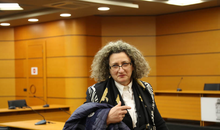
Convicted in Greece, after SPAK DP request to ILD: Dismiss judge Irena Gjoka
2025-05-06 13:09:35
Electoral crimes, SPAK takes stock: 115 reports have been filed so far
2025-05-06 13:00:37
Quarrel between two families in Has, two people injured
2025-05-06 12:53:08
Voice before SPAK: I do not withdraw from the accusations against Vilma Nushi
2025-05-06 12:33:33


"Giro d'Italia" in Albania, here's how car traffic changes in Tirana
2025-05-06 12:04:17

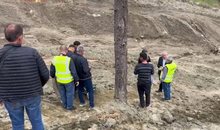
The collapse of the massive chrome mine, still no sign of the old man in Klos
2025-05-06 11:29:31
Xhaferri: Crime gangs work for the MPs they want
2025-05-06 11:19:53
Zhupa in Ksamil: 'The Maldives of Europe' turned into a trash can
2025-05-06 11:10:55
Merz fails to be elected German chancellor
2025-05-06 11:00:00
The fall of the euro is boosting imports in quantity, increasing by 14% in 2024
2025-05-06 10:56:33
Accident in Roskovec, two passengers injured
2025-05-06 10:47:36


DP denounces election crimes in Peshkopi to SPAK
2025-05-06 10:18:20
The hearing against Mediu is postponed, due to Irena Gjoka's medical report.
2025-05-06 10:08:50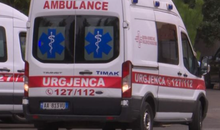
Two accidents in Elbasan, 1 victim and 2 injured reported
2025-05-06 09:52:26


Rama pressures citizens: Either vote for the SP, or don't vote at all
2025-05-06 09:15:00
From defense to immigration, what does the new German government promise?
2025-05-06 09:08:42
After 1,245 days in office, Scholz steps down as chancellor
2025-05-06 08:55:38


'Vote Exchange': Shkodra between the PS-PD rivalry and the "Doshi" factor
2025-05-06 08:29:28
Horoscope, what do the stars have in store for you today?
2025-05-06 08:23:05
Rain returns, what is the weather expected to be like during the day?
2025-05-06 08:06:41
Morning Post/ In 2 lines: What mattered yesterday in Albania
2025-05-06 07:50:44

Topalli: Small parties have no chance of getting a mandate
2025-05-05 22:42:40
SP officials in prison for corruption, Rama: We are not a law firm
2025-05-05 22:36:42


Soul-touching hours: Discover when we are saddest and happiest during the day
2025-05-05 21:47:20
Alimehmeti: DP in Tirana gets more than 12 mandates
2025-05-05 21:34:33


Berisha: Rama knows Dibra as much as Toni Gogu knew Hajredin Pasha
2025-05-05 21:01:00


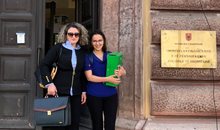


27-year-old drunk driver hits police officer in Peshkopi
2025-05-05 19:50:14
